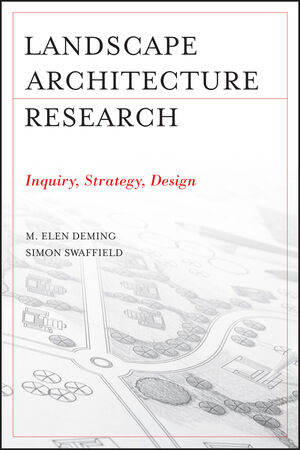Landscape Architectural Research: Inquiry, Strategy, DesignISBN: 978-0-470-56417-2
Paperback
272 pages
April 2011
 |
||||||
Preface xi
Acknowledgments xiii
Chapter 1 Introduction 1
1.1 Knowledge in Landscape Architecture 1
1.2 The Need for a Guide 2
1.3 The Gatekeeping Dilemma in Context 4
1.4 Mapping the Terrain 7
1.5 Building a Research-Based Discipline 13
References 15
Chapter 2 Knowing Landscape Architecture 17
2.1 Introduction 17
2.2 The Nature of Professional Disciplines 17
2.3 Domains of Knowledge in Landscape Architecture 20
2.4 Research Needs 26
References 29
Chapter 3 Theory/Research/Scholarship/Critique 30
3.1 Introduction 30
3.2 Competing Ideals of Theory 31
3.3 Representing Theory 34
3.4 Theoretical Conversations 35
3.5 Research and Scholarship 37
3.6 Studio Design as a Research Setting 40
3.7 Theory and Critique 42
3.8 Conclusion 43
References 44
Chapter 4 Integrating Design and Research 48
4.1 Introduction 48
4.2 Problems and Purpose 48
4.3 Framing a Research Question 52
4.4 Degrees of Research 53
4.5 Assessing Research Quality 56
4.6 A Developmental Heuristic 58
References 63
Chapter 5 Descriptive Strategies 65
5.1 Introduction 65
5.2 Observation 66
5.3 Secondary Description 71
5.4 Descriptive Social Surveys 72
5.5 Complex Description 77
5.6 Descriptive Case Studies 79
Descriptive Strategies: Summary 85
References 85
Chapter 6 Modeling and Correlational Strategies 87
6.1 Introduction 87
6.2 Descriptive/Synthetic Models 89
6.3 Analytical Models and Correlation 90
6.4 Simple Correlation 93
6.5 Multiple Correlations 96
6.6 Spatial Correlations 98
6.7 Predictive Modeling 101
6.8 Dynamic Simulation Modeling 103
Modeling Strategies: Summary 110
References 112
Chapter 7 Experimental Strategies 114
7.1 Introduction 114
7.2 Classic Experiments 116
7.3 Field Experiments 119
7.4 Quasi Experiments 119
7.5 The Metaphor of Experimentation 122
Experimental Strategies: Summary 124
References 124
Chapter 8 Classification Schemes 126
8.1 Introduction 126
8.2 Collection/Inventory/Catalogue 128
8.3 Typology 133
8.4 Taxonomy 136
8.5 Index 140
8.6 Bibliography and Literature Review 144
Classification Strategies: Summary 149
References 149
Chapter 9 Interpretive Strategies 152
9.1 Introduction 152
9.2 Ethnography 153
9.3 Discourse Analysis 161
9.4 Iconology and Iconography 164
9.5 Historiography 165
Interpretive Strategies: Summary 169
References 172
Chapter 10 Evaluation and Diagnosis 174
10.1 Introduction 174
10.2 Parameters, Norms, and Rubrics 175
10.3 Design Evaluation 179
10.4 Diagnostics 181
10.5 Landscape Assessment 184
Evaluation and Diagnosis Strategies: Summary 187
References 190
Chapter 11 Engaged Action Research 192
11.1 Introduction 192
11.2 Action Dimensions in Pedagogical Research 194
11.3 Participatory Design in Service Learning 197
11.4 Participatory Action Research (PAR) 200
11.5 Transdisciplinary Action Research (TDAR) 202
Engaged Action Research Strategies: Summary 203
References 204
Chapter 12 Projective Design 205
12.1 Design as Research 205
12.2 Design Operations 209
12.3 Design Interpretations 215
12.4 Design Reflections 217
Projective Design Strategies: Summary 221
References 221
Chapter 13 Logical Systems (Axioms, Rules, and Argumentation) 223
13.1 Introduction 223
13.2 Logical Relationships 224
13.3 Synthetic Logic 227
13.4 Expanded Field Analysis 228
13.5 Spatial Syntax as Logical System 229
13.6 Pattern Language 231
Logical Systems: Summary 234
References 235
Chapter 14 Research and Practice 237
14.1 Introduction 237
14.2 Integrating Research Strategies into Practice—Evidence-Based Design 239
14.3 Integrating Research into Practice—Polemical Transformation 240
14.4 Integrating Knowledge into Practice—Grassroots Movements 241
14.5 Organizing Practice-Based Research 242
14.6 Reprise 246
References 247
Index 249



